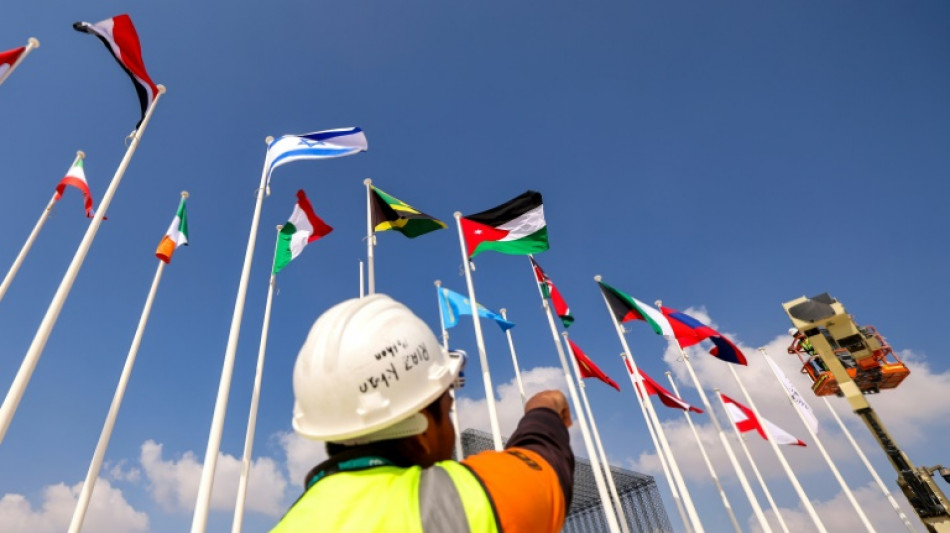The UN climate conference opened Thursday with nations urged to make faster cuts to planet-warming emissions and phase out fossil fuels as scepticism swirls over the oil-rich United Arab Emirates hosting the talks.
The two-week-long negotiations in a vast exhibition venue in Dubai come at a pivotal moment, with emissions still climbing and the UN saying this year is likely to be the hottest in human history.
World leaders, Britain's King Charles III and activists and lobbyists are among more than 97,000 people jetting into the flashy Gulf city, which boasts the world's tallest skyscraper, one of its busiest airports, and an indoor ski slope.
Double the size of last year's conference, COP28 is billed as the largest-ever climate gathering and the UN and hosts the UAE say they will be the most important since Paris 2015.
There, nations agreed to limit global warming to well below 2 degrees Celsius since the pre-industrial era, and preferably to a safer limit of 1.5C.
But scientists say the world is off-track, and the nearly 200 nations gathering for COP28 must commit to accelerating climate action or risk the worst impacts of a warming planet.
UN Secretary-General Antonio Guterres said leaders should aim for a complete "phaseout" of fossil fuels, a proposal opposed by some powerful nations that has dogged past negotiations.
"Obviously, I am strongly in favour of language that includes (a) phaseout, even with a reasonable time framework," Guterres told AFP before flying to Dubai.
A central focus will be a stocktake of the world's limited progress on curbing global warming, which requires an official response at these talks.
- Hosts under fire -
On Thursday, nations are expected to formally approve the launch of a "loss and damage" fund to compensate climate-vulnerable countries after a year of hard-fought negotiations over how it would work.
But it remains to be filled, with rich nations urged to make contributions so the money can start flowing.
The UAE sees itself as a bridge between the rich developed nations most responsible for historic emissions and the rest of the world, which has contributed less to global warming but suffers its worst consequences.
But the decision for it to host has attracted a firestorm of criticism, particularly as the man appointed to steer the talks, Sultan Al Jaber, is also head of UAE state oil giant ADNOC.
Jaber, who also chairs a clean energy company, has defended his record, and strenuously denied this week that he used the COP presidency to pursue new fossil fuel deals, allegations first reported by the BBC.
Christiana Figueres, who was UN climate chief when the Paris deal was reached, questioned the role of fossil fuel companies at COP and said she was "giving up hope" they could be part of the solution to warming.
Guterres said Jaber was in a better position to tell the oil industry that a fossil fuel phaseout was necessary than "if he was the member of an NGO with a very solid pro-climate record."
"A very clear signal that the era of fossil fuels needs to end very rapidly is our litmus test for COP28," said Romain Ioualalen, global policy campaign manager at Oil Change International.
- Rule by consensus -
Rallying a common position on the matter will be difficult at COP where all nations -- whether dependent on oil, sinking beneath rising seas or locked in geopolitical rivalry -- must take decisions unanimously.
The UAE hopes to marshal an agreement on the tripling of renewable energy and doubling the annual rate of energy efficiency improvements by 2030.
Nations will navigate a range of thorny issues between November 30 and December 12, and experts say geopolitical tensions and building trust could be a huge challenge.
At the opening of the conference, delegates were asked to pause for a minute's silence for civilians killed in the Gaza conflict.
On the sidelines of COP, Israeli President Isaac Herzog will hold talks with diplomats on the release of hostages held by Hamas, his office said. He is also scheduled to speak on Friday within minutes of Mahmoud Abbas, leader of the Palestinian Authority.
Neither US President Joe Biden nor Chinese President Xi Jinping are attending, though Washington is sending Vice President Kamala Harris.
But the US and China, the world's two biggest polluters, did make a rare joint announcement on the climate this month that spurred optimism going into COP.
E.Narula--BD
